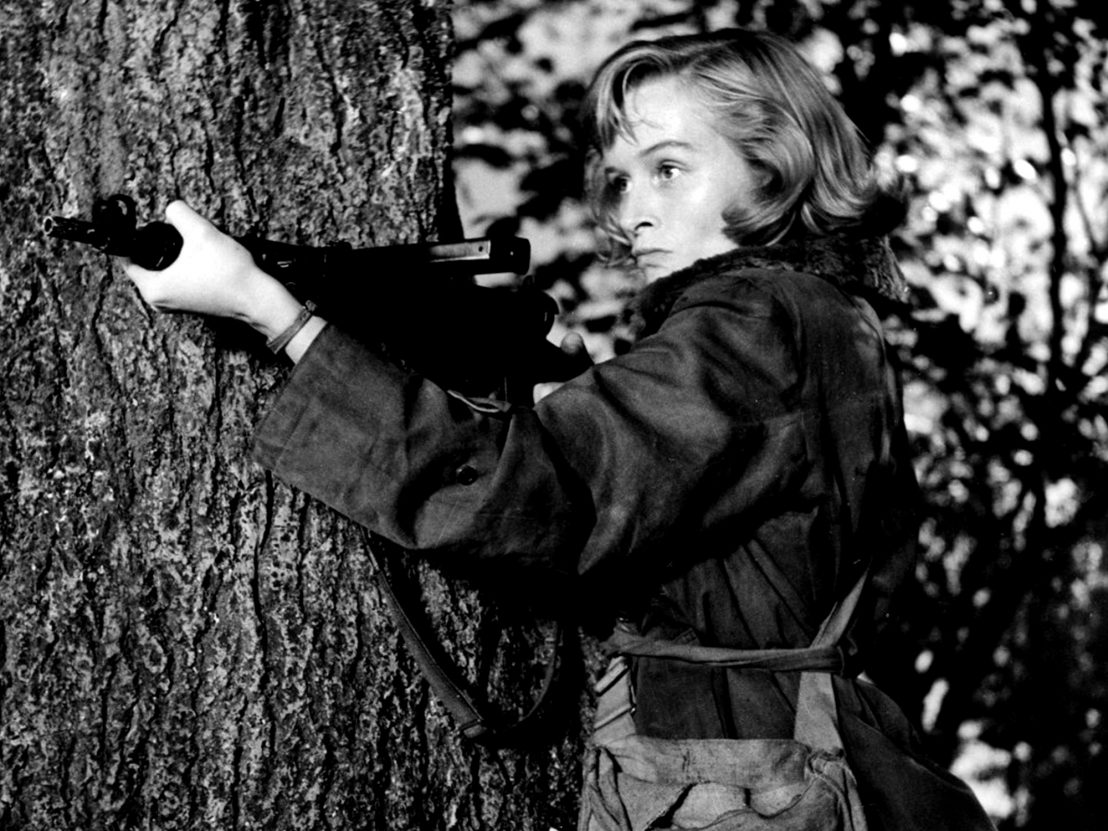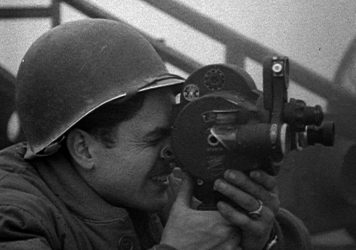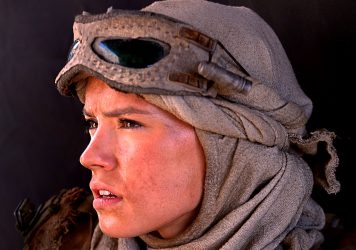
World War Two movies are inherently masculine, often having little time for female characters. The majority of women who do appear are usually resigned to the wives, mothers, lovers or nurses. This isn’t to diminish the incredible value of the women on the home front and their vital contribution to the war effort, but according to the movies, when it comes to the nitty-gritty stuff, women simply weren’t in the picture. Dig a little deeper, however, and you’ll find plenty of examples of women putting themselves in harm’s way in service of their country.
The home front effort cannot be entirely ignored on this list, with the majority of women rarely able to expand beyond their town boundaries. Alberto Cavalcanti’s 1942 film of a small, English village infiltrated by the German army provides the perfect example of a community, especially the women, joining together to fight the enemy despite their humbly pastoral circumstances. The finale depicts the women as the true defenders of the people, as a group of Women’s Land Army girls escape from the German soldiers, arm themselves and engage in battle.
Filmed within months of the German soldiers deserting the Italian capital, Roberto Rossellini portrays the Nazi occupation of Rome in 1944 and the ensuing resistance from its people. Though the lead character is male, the film revolutionises the ‘village woman’ to heroic proportions with its most memorable character, Pina, played by Anna Magnani. Based on Teresa Gullace, a Roman woman whose violent death prompted so much outrage that she became a martyr for the Resistance. Rossellini illuminates the plight of the victimised and under-appreciated role of women during the War, as well as their acts of bravery and resistance.
Unlike other depictions of real World War Two soldiers, Herbert Wilcox’s 1950 film of Odette Sansom Hallowes, Allied Intelligence Officer, benefited from the supervision of the woman herself. With actress Anna Neagle spending a year with the film’s namesake, visiting the prisons and camps where she was brutally interrogated and imprisoned during her service. Odette represents the most celebrated members of the SOE. One of the few to survive Nazi imprisonment and rightfully heralded as a heroine, being the first woman to be awarded the George Cross, Violette Szabo being the second.
A momentous account of female soldiering, Carve Her Name with Pride was years ahead of its time in the way it depicted gender roles during the War. Lewis Gilbert directs Virginia McKenna as Special Operations Executive agent, Violette Szabo, based on the real resistance fighter who paradropped into occupied France and destroyed Nazi infrastructure until she was captured and sent to a concentration camp. McKenna executes the physicality of the role with gumption, having spent weeks learning unarmed combat, firing machine guns and jumping from a parachute training platform herself. However, none of the character’s femininity or delightful charm is sacrificed.
Larisa Shepitko studied with the likes of Andrei Tarkovsky, Sergei Parajnov and her husband Elem Klimov before tragically dying in a car accident before her work could be widely received. Wings marks her first feature after graduation, starring character actress Maya Bulgakova as a headmistress, remembering the thrill of being a World War Two fighter pilot and struggling to adjust with peacetime. Unlike Odette, the focus here is on the forgotten war hero and can be said to represent the horde of women who fought for their country but faded, or remain inexistent, in public memory.
During wartime women are often overlooked, making them effective as special operatives and spies as they didn’t arouse suspicion. Director Jean-Paul Salome shows precisely this in his 2008 film Female Agents aka Les Femmes de L’ombre, literally women of the shadows. Inspired by a Times article on Lise Villameur, a French Resistance agent who worked for the SOE (the Special Operations Executive created by Winston Churchill), the film unabashedly portrays the risk and violent consequences surrounding these women if they were ever discovered.
Quentin Tarantino’s war flick places female characters at the forefront of the blood spattered, bullet riddled, burning revenge against the Third Reich. Though it is the group of ‘Basterds’ who hold the guns and spatter the blood, it’s Bridget von Hammersmark (Diane Kruger) who not only provides them with the key information to execute the final plot but formulates the entire plan to end the War and end Hitler. The character was heavily inspired by real-life German actress and Allied supporter, Marlene Dietrich, who famously rejected any association with the Nazi Party.
Steven Spielberg and Tom Hanks are renowned for their contribution to the World War Two genre in the form of 1998’s Saving Private Ryan and the subsequent HBO series Band of Brothers and The Pacific. While they all boast a majority male cast, The Pacific differs in its portrayal of Lena Riggi Basilone. While the storyline focuses on Medal of Honour receiver John Basilone, Lena was also a Marine sergeant who only had one less stripe than John. Though she only appears in the final two episodes, Annie Parisse conveys Basilone’s determined independence with grace and humility.
An exception to contemporary inclusion of women in the World War Two genre movie, is Marvel’s own depiction of the war. Steve Roger’s love-interest Peggy Carter not only aids the title character in combat against the Nazis, but is one of the key minds that transforms Rogers into Captain America. Hayley Attwell shines as a figurehead of intelligence, combat know-how and confidence. Melding early waves of feminism with contemporary attitudes with the continuation of her character’s arc in the TV spin-off, Agent Carter. Though cancelled after the second season, it remains an important headway in depictions of females in military authority. We know her value.
Strength doesn’t just come from being armed. Giving a woman a gun doesn’t make her a more empowering figure. Rather, women’s efficacy in the resistance is proved through their initiative, intellect and bravery. Nowhere is this more applicable than in Keira Knightley’s representation of Joan Clarke in The Imitation Game. A genius in her field, Clarke was still paid less than her male counterparts at Bletchley Park despite being deputy head of the operation and a key figure in the Enigma project which decrypted Nazi Germany’s secret communications. Clarke is the epitome of restrained potential – a woman working in a man’s world.
Published 15 Jul 2017

Five Came Back reveals how a handful of famous directors went to war and came back changed.

By Dan Einav
The Star Wars actor will reportedly play an Allied spy in the upcoming espionage thriller.

Gulîstan, Land of Roses follows an all-female regiment of Kurdish guerillas as they prepare for war against Daesh.